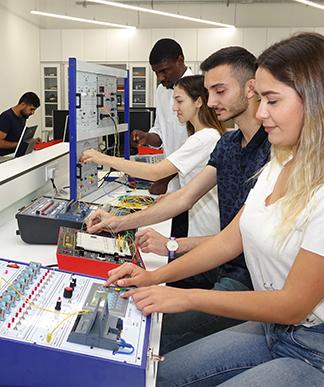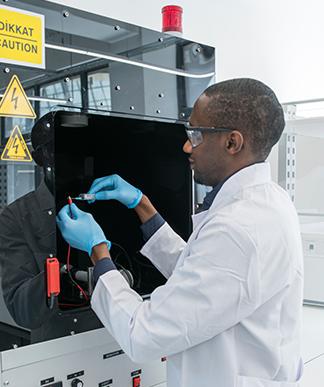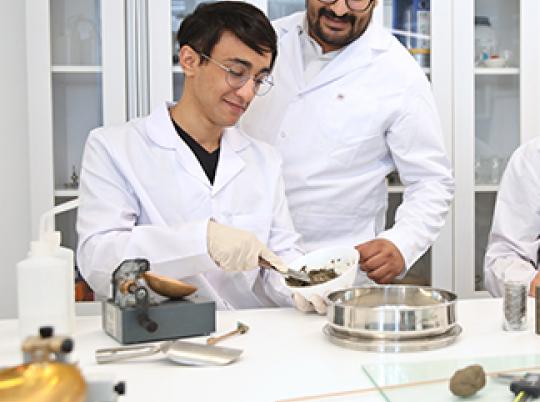


About the Department
Mechanical engineering is one of the most comprehensive branches of the field of engineering. Heat energy, manufacturing, industrial machinery and equipment, heating and cooling systems, transportation, and all kinds of machines give the opportunity for a mechanical engineer to work in many diverse areas, such as: designing new machines, developing new technologies, adopting or using the existing technologies in new areas, maintenance and manufacturing. These are among the fundamental objectives of students who wish to study mechanical engineering. Mandatory summer internship, technical site visits, seminars given by engineers or managers from industrial companies will provide an opportunity to obtain information about the wide range of practices. Annual career days organized by the university will enable students to better understand their interests and help choose their elective courses accordingly.
Educational Opportunities
Mechanical engineering is the foundation of the majority of the field of engineering. For this reason, our graduates who are trained in mechanical engineering can specialize in different fields of the industry. Our graduates have the infrastructure in which they can work in various fields such as automotive, aerospace, energy conversion, automation, manufacturing, environmental control, and bio-technology. Also, our mechanical engineers are trained to act with environmental awareness and professional ethics in the workplace. In this framework, our students are trained to show sensitivity to these issues in their designs and practices.

Career Areas
Mechanical engineering is the foundation of the majority of the field of engineering. For this reason, our graduates who are trained in mechanical engineering can specialize in different fields of the industry. Our graduates have the infrastructure in which they can work in various fields such as automotive, aerospace, energy conversion, automation, manufacturing, environmental control, and bio-technology. Also, our mechanical engineers are trained to act with environmental awareness and professional ethics in the workplace. In this framework, our students are trained to show sensitivity to these issues in their designs and practices.
Contact
Faculty of Engineering
Science and Technology Center, ST 226
Tel: +90 392 671 1111 Extension: 2401
Faculty E-mail: secretary-fe@ciu.edu.tr
Head of Department: Assoc. Prof. Dr. Keyvan BAHLOULI
Head of Department E-mail: kbahlouli@ciu.edu.tr
Compulsory Courses
First Semester
GENERAL CHEMISTRY
Course code
CHEM110Credit
4Theoretical
3Practical
2Ects
6INTRODUCTION TO COMPUTING
Course code
CMPE101Credit
3Theoretical
2Practical
2Ects
5READING AND WRITING SKILLS-I
Course code
ENGL141Credit
3Theoretical
2Practical
2Ects
4CALCULUS-I
Course code
MATH101Credit
3Theoretical
3Practical
1Ects
5INTRODUCTION TO MECHANICAL ENGINEERING
Course code
MCLE100Credit
0Theoretical
1Practical
0Ects
1GENERAL PHYSICS-I
Course code
PHYS101Credit
4Theoretical
3Practical
2Ects
6TURKISH LANGUAGE
Course code
TREG100Credit
0Theoretical
2Practical
0Ects
2TURKISH
Course code
TURK100Credit
0Theoretical
2Practical
0Ects
2Second Semester
INTRODUCTION TO PROGRAMMING
Course code
CMPE111Credit
4Theoretical
3Practical
2Ects
6READING AND WRITING SKILLS-II
Course code
ENGL142Credit
3Theoretical
2Practical
2Ects
4HISTORY OF CIVILIZATION
Course code
HIST100Credit
0Theoretical
2Practical
0Ects
2CALCULUS-II
Course code
MATH102Credit
3Theoretical
3Practical
1Ects
5LINEAR ALGEBRA
Course code
MATH121Credit
2Theoretical
2Practical
0Ects
3MECHANICAL ENGINEERING DRAWING
Course code
MCLE102Credit
2Theoretical
1Practical
3Ects
5GENERAL PHYSICS-II
Course code
PHYS102Credit
4Theoretical
3Practical
2Ects
6MODERN TURKISH HISTORY
Course code
TARH100Credit
0Theoretical
2Practical
0Ects
2Third Semester
ENGINEERING MECHANICS-I
Course code
CVLE211Credit
4Theoretical
4Practical
1Ects
6MATERIALS SCIENCE
Course code
CVLE224Credit
4Theoretical
4Practical
1Ects
6DIFFERENTIAL EQUATIONS
Course code
MATH203Credit
3Theoretical
3Practical
1Ects
5INTRODUCTION TO PROBABILITY AND STATISTICS
Course code
MATH205Credit
4Theoretical
4Practical
1Ects
6MECHANICAL WORKSHOP
Course code
MCLE210Credit
2Theoretical
1Practical
3Ects
7Fourth Semester
THERMODYNAMICS
Course code
ENRE212Credit
4Theoretical
3Practical
2Ects
7NUMERICAL ANALYSIS
Course code
MATH204Credit
3Theoretical
3Practical
1Ects
4ENGINEERING MECHANICS-II
Course code
MCLE222Credit
4Theoretical
4Practical
1Ects
7STRENGHT OF MATERIALS
Course code
MCLE270Credit
4Theoretical
3Practical
2Ects
7UNIVERSITY ELECTIVE
Course code
UNIEXX1Credit
3Theoretical
3Practical
0Ects
5Fifth Semester
FREE ELECTIVE
Course code
FREEXX1Credit
4Theoretical
3Practical
2Ects
7SUMMER TRAINING-I
Course code
MCLE200Credit
0Theoretical
0Practical
0Ects
2CONTROL SYSTEM
Course code
MCLE303Credit
3Theoretical
3Practical
1Ects
5MANUFACTURING TECHNOLOGY
Course code
MCLE311Credit
4Theoretical
4Practical
1Ects
6MACHINE ELEMENTS I
Course code
MCLE371Credit
3Theoretical
3Practical
1Ects
5UNIVERSITY ELECTIVE
Course code
UNIEXX2Credit
3Theoretical
3Practical
0Ects
5Sixth Semester
MACHINE ELEMENTS-II
Course code
MCLE372Credit
3Theoretical
3Practical
1Ects
6FLUID MECHANICS
Course code
MCLE382Credit
4Theoretical
4Practical
1Ects
6AREA ELECTIVE
Course code
MCLEXX1Credit
3Theoretical
3Practical
0Ects
6AREA ELECTIVE
Course code
MCLEXX2Credit
3Theoretical
3Practical
0Ects
6AREA ELECTIVE
Course code
MCLEXX3Credit
3Theoretical
3Practical
0Ects
6Seventh Semester
PROJECT MANAGEMENT
Course code
ENGI401Credit
3Theoretical
3Practical
0Ects
5FREE ELECTIVE
Course code
FREEXX2Credit
4Theoretical
3Practical
2Ects
7ETHICS
Course code
INDE335Credit
3Theoretical
3Practical
0Ects
4SUMMER TRAINING-II
Course code
MCLE300Credit
0Theoretical
0Practical
0Ects
3AREA ELECTIVE
Course code
MCLEXX4Credit
3Theoretical
3Practical
0Ects
6UNIVERSITY ELECTIVE
Course code
UNIEXX3Credit
3Theoretical
3Practical
0Ects
5Eighth Semester
CAPSTONE PROJECT
Course code
ENGI402Credit
4Theoretical
2Practical
4Ects
8ENGINEERING ECONOMY
Course code
INDE232Credit
3Theoretical
3Practical
0Ects
4EXPERIMENTAL METHODS
Course code
MCLE404Credit
3Theoretical
2Practical
3Ects
5SEMINARS-TOWARDS PROFESSIONAL LIFE
Course code
MCLE490Credit
0Theoretical
0Practical
1Ects
1AREA ELECTIVE
Course code
MCLEXX5Credit
3Theoretical
3Practical
0Ects
6AREA ELECTIVE
Course code
MCLEXX6Credit
3Theoretical
3Practical
0Ects
6Elective Courses
MACHINE DESIGN
Course code
MCLE476Credit
3Theoretical
3Practical
0Ects
HEATING VENTILATION AND AIR CONDITIONING
Course code
MCLE443Credit
3Theoretical
3Practical
0Ects
5THERMAL POWER ENGINES
Course code
MCLE446Credit
3Theoretical
3Practical
0Ects
WIND ENERGY TECHNOLOGY
Course code
ENRE312Credit
3Theoretical
3Practical
0Ects
WORLD ENERGY POLITICS
Course code
PNGE451Credit
3Theoretical
3Practical
0Ects
0SOLAR ENERGY TECHNOLOGY
Course code
ENRE311Credit
3Theoretical
3Practical
0Ects
PROGRAMMING IN MATLAB FOR ENGINEERING
Course code
ENGI316Credit
3Theoretical
3Practical
0Ects
FUNDAMENTALS OF ELECTRONICS
Course code
CMPE222Credit
4Theoretical
3Practical
2Ects
7HEAT AND MASS TRANSFER
Course code
ENRE302Credit
4Theoretical
3Practical
2Ects
6ENVIRONMENTAL IMPACT ASSESSMENT
Course code
ENVE402Credit
3Theoretical
3Practical
0Ects
AIR POLLUTION CONTROL PROCESSES
Course code
ENVE304Credit
3Theoretical
2Practical
2Ects
5ENERGY EFFICIENCY AND MANAGEMENT
Course code
ENRE313Credit
3Theoretical
3Practical
0Ects
5COMPUTER AIDED DESIGN
Course code
MCLE475Credit
3Theoretical
2Practical
3Ects
6CONVENTIONAL AND ALTERNATIVE ENERGY RESOURCES
Course code
PNGE452Credit
3Theoretical
3Practical
0Ects
0FUELS AND COMBUSTION
Course code
ENRE405Credit
3Theoretical
0Practical
0Ects
6MANAGEMENT FOR ENGINEERS
Course code
INDE382Credit
3Theoretical
3Practical
0Ects
0CONVENTIONAL AND ALTERNATIVE ENERGY RESOURCES
Course code
PNGE452Credit
3Theoretical
3Practical
0Ects
0ENERGY AUDITING
Course code
ENRE315Credit
3Theoretical
3Practical
0Ects
ENERGY SYSTEMS MODELING, ANALYSIS AND SIMULATION
Course code
ENRE304Credit
4Theoretical
3Practical
2Ects
7SOLAR ENGINEERING
Course code
MLE444Credit
3Theoretical
3Practical
0Ects
5MODELING AND SIMULATION
Course code
EELE246Credit
3Theoretical
3Practical
0Ects
OCCUPATIONAL HEALTH & SAFETY
Course code
INDE492Credit
3Theoretical
3Practical
1Ects
6ENERGY SYSTEMS-II
Course code
ENRE306Credit
3Theoretical
3Practical
1Ects
5ENVIRONMENTAL MANAGEMENT
Course code
ENVE407Credit
3Theoretical
3Practical
0Ects
5THERMAL SYSTEMS DESIGN
Course code
MCLE445Credit
4Theoretical
3Practical
2Ects
6ROBOTICS
Course code
EELE411Credit
3Theoretical
3Practical
1Ects
5EASTERN MEDITERRANEAN ENERGY GEOPOLITICS
Course code
PNGE340Credit
3Theoretical
3Practical
0Ects
0Energy Efficient Building Design
Course code
ENRE412Credit
3Theoretical
3Practical
0Ects
5Hydrogen Energy and Applications
Course code
ENRE414Credit
3Theoretical
3Practical
0Ects
0LIFE CYCLE COSTING FOR CONSTRUCTION
Course code
CVLE434Credit
3Theoretical
3Practical
0Ects
ARTIFICIAL ORGANS
Course code
BIME404Credit
3Theoretical
3Practical
0Ects
COMPUTER AIDED DATA ANALYSIS
Course code
INDE491Credit
3Theoretical
3Practical
0Ects
TOTAL QUALITY MANAGEMENT
Course code
INDE428Credit
3Theoretical
3Practical
0Ects
ENVIRONMENTAL CONTROL IN PETROLEUM ENGINEERING ACTIVITIES
Course code
PNGE406Credit
3Theoretical
3Practical
0Ects
0ENHANCED GAS PRODUCTION
Course code
PNGE393Credit
3Theoretical
3Practical
0Ects
5GEOTHERMAL ENGINEERING
Course code
PNGE391Credit
3Theoretical
3Practical
0Ects
5MIDDLE EAST ENERGY OUTLOOK
Course code
PNGE415Credit
3Theoretical
3Practical
0Ects
5CIRCUIT THEORY II
Course code
EELE212Credit
4Theoretical
4Practical
1Ects
7BIOINFORMATICS
Course code
BIOE305Credit
3Theoretical
3Practical
0Ects
5COAL GAS PRODUCTION
Course code
PNGE392Credit
3Theoretical
3Practical
0Ects
5SUPPLY CHAIN AND LOGISTICS MANAGEMENT
Course code
INDE461Credit
3Theoretical
3Practical
0Ects
0HAZARDOUS AND SPECIAL WASTE MANAGEMENT
Course code
ENVE431Credit
3Theoretical
3Practical
0Ects
5IOT FOR ENGINEERING
Course code
ENGI416Credit
3Theoretical
2Practical
2Ects
5ENVIRONMENTAL POLLUTION AND ECOLOGY
Course code
ENVE308Credit
3Theoretical
3Practical
0Ects
MOBILE APPLICATION DEVELOPMENT
Course code
CMPE425Credit
3Theoretical
3Practical
0Ects
PUBLIC HEALTH
Course code
ENVE410Credit
3Theoretical
3Practical
0Ects
4BIOPROCESS ENGINEERING
Course code
BIOE308Credit
4Theoretical
3Practical
2Ects
7SOIL AND GRD.WATER POLLUTION
Course code
ENVE427Credit
3Theoretical
3Practical
0Ects
NETWORK ANALYSIS
Course code
INDE301Credit
3Theoretical
3Practical
0Ects
MATERIALS SCIENCE
Course code
CVLE224Credit
4Theoretical
4Practical
1Ects
6SOIL AND GROUNDWATER POLLUTION
Course code
ENVE427Credit
3Theoretical
3Practical
0Ects
SPECIAL TOPICS IN ENVIRONMENTAL ENGINEERING I
Course code
ENVE494Credit
3Theoretical
3Practical
0Ects
5ENGINEERING MANAGEMENT
Course code
INDE282Credit
3Theoretical
3Practical
0Ects
4CLOUD COMPUTING
Course code
CMPE481Credit
3Theoretical
3Practical
0Ects
SURGICAL INSTRUMENTATION
Course code
BIME402Credit
3Theoretical
3Practical
0Ects
UNCONVENTIONAL PETROLEUM RESOURCES
Course code
PNGE434Credit
3Theoretical
3Practical
0Ects
4AFRICA ENERGY OUTLOOK
Course code
PNGE425Credit
3Theoretical
3Practical
0Ects
5TR Applicants
TR Students who are successful in the exams conducted by the Higher Education Council Student Selection and Placement Center (ÖSYM) and are entitled to enroll in our university in line with their preferences can complete the registration process with the necessary documents for registration from our Registration and Liaison Offices throughout Turkey or from the Marketing Directorate on campus.
Click for detailed admission requirements information.
TRNC Applicants
TRNC citizens and TR citizen candidate students who have completed their entire high school education in TRNC. They are placed in undergraduate programs in line with their success in the CIU Student Placement and Scholarship Ranking Exam and the programs they prefer.
Students who are successful in the exam can register from the TRNC Marketing Office.
Applicants can directly apply online to our undergraduate programs using the application portal. Please fill in your details correctly and upload all the required documents listed on the last page of the application form.
Required documents;
- Completed application form,
- Higher/Secondary Certificate or equivalents (e.g. O/A’Level, WAEC/NECO),
- Evidence of English Language competence: TOEFL (65 IBT) or IELTS (5.5). Students without these documents will take the CIU English proficiency exam on campus following arrival,
- Scanned copy of international passport/birth certificate,
- Fully completed and signed CIU Rules and Regulations document (which can be downloaded during the online application).
Cyprus International University provides academic scholarships for its students as an incentive for success, with most students benefiting from 50%, 75% or 100% scholarships or discounted tuition fees. Click for more information.
Tuition Fees are determined at the beginning of each academic year. Candidate students who are entitled to enroll in CIU can learn their fees in line with the Tuition Fee Calculation system.